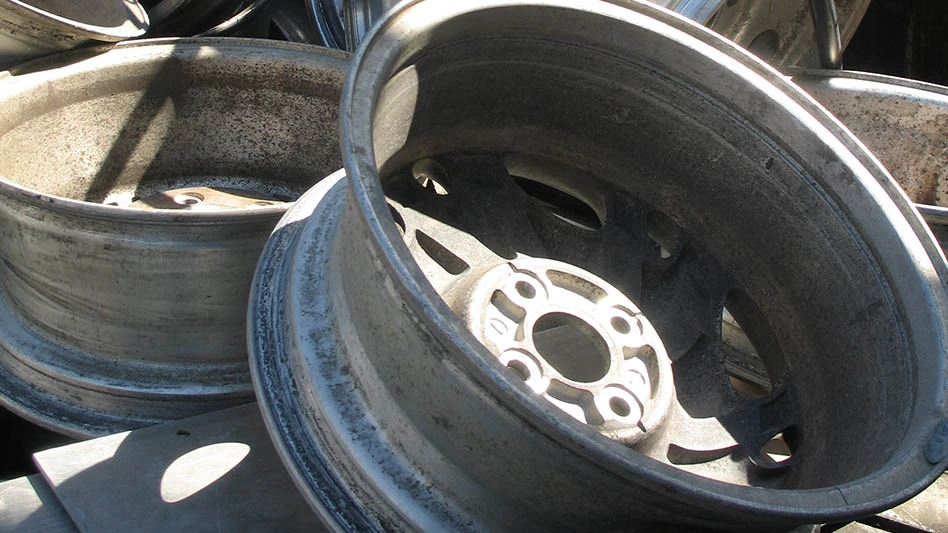 Photos by Bill SawalichEvolution often is the hallmark of business success, as a company must adjust its focus to respond to changing business conditions. In its 97 years, St. Louis-based scrap paper broker and processor Federal International Inc. has diversified the materials it handles as well as the services it offers. Despite these changes, the company's business philosophy has remained consistent, according to Recycling Division President John Daniel. "It's our job to do everything we can to help our suppliers succeed," he says. "Our success will follow if we make them successful."
Photos by Bill SawalichEvolution often is the hallmark of business success, as a company must adjust its focus to respond to changing business conditions. In its 97 years, St. Louis-based scrap paper broker and processor Federal International Inc. has diversified the materials it handles as well as the services it offers. Despite these changes, the company's business philosophy has remained consistent, according to Recycling Division President John Daniel. "It's our job to do everything we can to help our suppliers succeed," he says. "Our success will follow if we make them successful."
A Little Background
Federal International was founded in 1914 as a traditional paper stock plant, handling rags as well as scrap paper. In the 1930s the company expanded into brokerage services, focusing primarily on developing relationships with printers, Daniel says.
Federal International retained this focus until Mel Leskowitz joined the company in 1959. In his second year with Federal International, Leskowitz got his hands on a load of polyurethane foam. This humble load led to the formation of two new divisions with Federal International as the parent company. Leskowitz developed markets and brokerage services for polyurethane foam in the United States and Europe and opened a number of greenfield foam converting plants—seven plants in seven countries by 1968, Daniel says, in addition to three U.S. plants. Six of these plants still operate today, including Federal Foam Technologies, which has an industrial division in New Richmond, Wis.; a commercial division in Ellsworth, Wis.; and a consumer division in Cokato, Minn. By 1980 the Federal International's foam division had grown to be larger than the company's long established paper recycling division.
In 1983 Leskowitz purchased Federal International, closing the company's paper stock plant in St. Louis shortly afterward to focus on its brokerage business. The plant had not been making acceptable returns, Daniel says. The brokerage business became Federal International's primary focus throughout the 1990s, when it eclipsed the polyurethane foam business. Daniel says the company focused on high grades, working with involuntary generators, such as printers. "Printers represented over half of our supply," he adds.
The company would not stay out of paper stock processing for long, however. By the mid-1990s, Federal International had purchased an existing recycling plant in Jefferson City, Mo.
Federal International's brokerage business was focused on the domestic market until 2000, when the company entered the Mexican market and also expanded the scrap paper it traded to include bulk grades. "That was a relatively big change for us, because we really did very little OCC (old corrugated containers) up to that point," Daniel says.
When Daniel joined the company in 2005, more changes were in store. At that time, Federal International was a brokerage firm with a recycling plant. "I made it very clear to Mel that my goal was to convince him that we needed to be a recycling plant company that had a great brokerage arm," he says. "Because to me, having a recycling plant network and a great brokerage arm together, there's a lot of synergies and it makes a lot of sense in a lot of ways. I really feel like the outlook for recycling plants is better than the outlook for brokerage," Daniel continues. "Brokerage is so efficient and the barriers to entry are so low."
Federal International's brokerage business continued to focus on involuntary generators and expanding its international trade. "We figured IP (International Paper) and Georgia Pacific—you can go down the list of all the domestic mills—they don't really need or want brokers to fiber their mills," Daniel says. However, mills in China and India do have this need currently, he adds.
The company also sought to expand its relationship with its suppliers in the last decade. "We really tried to figure out creative ways to create value for our suppliers, whether through risk management, through financing [or] through upgrading," Daniel says. Federal International began acting as a consultant to its suppliers as well. "There are a lot of ways to make them more money without asking the mills to pay more," he says. "Maybe you can figure out ways to get more weight on a truck, which saves the mill freight, and the mill is willing to share that savings with the supplier." Daniel continues, "That is a great example of how everybody wins."
On to the Present
 In an effort to grow its recycling business, specifically its Jefferson City plant, Federal International bought out a competitor in the area and moved the entire business to a 120,000-square-foot building on 12 acres, which it outfitted with new equipment. "We fell just short of quadrupling that facility's volume from where we were in 2005," Daniel says. He predicts the company's Jefferson City plant will process 55,000 tons this year.
In an effort to grow its recycling business, specifically its Jefferson City plant, Federal International bought out a competitor in the area and moved the entire business to a 120,000-square-foot building on 12 acres, which it outfitted with new equipment. "We fell just short of quadrupling that facility's volume from where we were in 2005," Daniel says. He predicts the company's Jefferson City plant will process 55,000 tons this year.
In 2009, Federal International bought a 25 percent stake in a Dallas recycling plant. The following year, the company bought the plant outright and also built a greenfield plant in Houston, Daniel says, adding that Texas typically has been among the top three supply points for the company in the last five years. "The majority of our supply has always come from either Illinois, Missouri or Texas," he says. Daniel also had worked at recycling plants in Dallas and Houston earlier in his career, making him familiar with that market.
Federal International experienced rapid growth in Houston, having to relocate within six months of establishing the plant because it outgrew the building and baler. "We had figured it would be a two-to-three-year home for us," Daniel says. In April, the company moved to a 150,000-square-foot building and installed a Macpresse baler.
"With three recycling plants, we are no longer just a brokerage company," Daniel says of Federal International today. "The three recycling plants are a critical part of who we are."
Additionally, Federal International's brokerage division is the biggest supplier to two of the three recycling plants, he says. "The brokerage company also markets all of the material from all three recycling plants. Because of economies of scale and our scope and size in brokerage, we think we are able to sell at higher prices for our plants than we would if they operated without the brokerage company," Daniel continues. "We have a lot more volume to leverage."
|
INDUSTRY EDUCATION John Daniel has held numerous positions in the paper recycling business throughout his career, which began with Smurfit in St. Louis. "I spent five years with them in plant operations," says Daniel, who is currently president of Federal International, a recycling and brokerage company based in St. Louis. During his time at Smurfit, Daniel also was exposed to brokerage and procurement. At Smurfit, Daniel says he learned the "nuts and bolts" of a recycling plant. "I've realized since that most people are not lucky enough to get to do that." He jokes, "It didn't seem lucky at the time." Enron was Daniel's next stop. At the now infamous Texas company, he developed an international scrap paper trading group. Daniel credits his time with Enron for his education on the export market. "I learned how big the world is at Enron," he says. "I worked with smart people who knew how to sell. Most people at Enron didn't know much about recycling, but they were still some of the smartest people I've ever met." His career also has included managing brokerage and sales for Vista Fibers and serving as manager for BFI Acco Waste Paper and BFI Houston Commercial. |
Today, brokerage accounts for 75 percent of Federal International's volume, while its recycling plants account for 25 percent, Daniel says. He anticipates the company will handle a combined total of more than 540,000 tons across both divisions in 2011. When Daniel first joined the company in 2005, Federal International handled less than 200,000 tons total.
Federal International tripled its brokerage business volume from 2005 to 2009, Daniel says. He adds that the company has tried to differentiate itself from other brokers, specifically export brokers, by combining its focus on printers with its focus on export markets. "We tried to establish ourselves as the independent recycling company that knows how to maximize revenue for printers, for box shops and for converting plants by directly accessing all the export markets, understanding all the domestic markets and understanding plastics," Daniel says. "That is where we have focused our mission—on helping these guys with their recycling programs."
To ship directly to mills in China, Federal International had to obtain an AQSIQ (General Administration of Quality Supervision, Inspection and Quarantine) license. The company also hired Leslie Then to head up its efforts in Asia, relocating him from China to St. Louis.
Rounding Out the Business
In addition to diversifying between recycling and brokerage, Federal International also has sought to diversify its supply base. "Right now, involuntary generators are responsible for more than 50 percent of our volume," Daniel says. In addition, the company has contracts with five recycling plants to market all of their material. "That is another 15 percent of our total volume," he adds. Daniel describes the remaining 35 percent of Federal International's business as "day trading," where customers are largely shopping based on price.
With this diversified supply base, the range of grades the company handles also has expanded. Bulk grades, such as OCC, mixed paper and ONP (old newspapers), account for 55 to 60 percent of Federal International's current volume, in contrast to the company's high-grade focus in its earlier years. "No one grade represents more than 25 percent of our volume," Daniel adds.
Federal International seeks out customers that can benefit from enhancements to their recycling programs, companies for which recycling is a by-product of their core business, he says. The company has been able to help its grocery stores clients, for instance, backhaul bales and recycle LDPE (low-density polyethylene). "There are only so many printers out there that are big enough to be brokered—probably less than 100," Daniel says. This fact made diversification a necessity if the company was going to continue to grow.
Beyond the United States and Asia, the company's Leeds, England-based brokerage office purchases material in five European countries. Federal International also buys material from five countries in North and Central America, Daniel says.
"We have worked very hard on building our business and insulating ourselves from the ups and downs of the market," Daniel says. "We don't make money speculating on the market. We've really worked hard on protecting our supply with contracts that allow us to make some money no matter what is happening in the market."
The company has worked to create value for its clients, and also for itself, by looking at the total cost of their recycling programs and the revenue produced by these programs, he says.
For example, by developing a landfill avoidance and recycling program for one of the printing companies it works with, Federal International was able to save the company $6,000 per month on its landfill bill, Daniel says. "We help them internally by putting in the right equipment or the right process or by installing best practices at the plant level." He adds, "The right partners for us are people that appreciate all that and are OK with us making some money because of all of the value we are creating for them."
Looking Down the Road
Federal International's recent growth has positioned the company to invest in its operations. In 2012, Daniel says, Federal International has plans for significant baling and sorting equipment upgrades at all three of its recycling facilities, which will include expanding into single-stream processing at two of its plants.
"It is highly likely that we will expand our plant network by adding a fourth plant," he adds.
Federal International also has plans to focus its brokerage business on international growth by expanding its sales outlets overseas, Daniel says.
"We want all of our growth to be coming from our core strategy," he adds. "We're not good at everything, and we are not going to try to be everything to everybody. We're going to focus in on some things that we know we're very good at and try to aggressively grow that around the world."
Industry Education John Daniel has held numerous positions in the paper recycling business throughout his career, which began with Smurfit in St. Louis.
"I spent five years with them in plant operations," says Daniel, who is currently president of Federal International, a recycling and brokerage company based in St. Louis. During his time at Smurfit, Daniel also was exposed to brokerage and procurement.
At Smurfit, Daniel says he learned the "nuts and bolts" of a recycling plant. "I've realized since that most people are not lucky enough to get to do that." He jokes, "It didn't seem lucky at the time."
Enron was Daniel's next stop. At the now infamous Texas company, he developed an international scrap paper trading group.
Daniel credits his time with Enron for his education on the export market. "I learned how big the world is at Enron," he says. "I worked with smart people who knew how to sell. Most people at Enron didn't know much about recycling, but they were still some of the smartest people I've ever met."
His career also has included managing brokerage and sales for Vista Fibers and serving as manager for BFI Acco Waste Paper and BFI Houston Commercial.
Federal International at a Glance
Officers: John Daniel , president, recycling division, and Claire Newton, CFO, Federal International
Location: Headquartered in St. Louis with recycling plants in Jefferson City, Mo.; Dallas; and Houston; and an overseas brokerage office in Leeds, England
No. Of Employees: 300 overall, with 80 in the recycling group
Equipment: Balers from Excel, Macpresse and Harris; shredders from Weima and Cresswood; two roll cutters; Applied Logic's RIMAS software; full camera systems for security and operational efficiency at all three of the company's recycling plants; and reverse ATM machines at its buy-back centers
Services Provided: Industrial, commercial and residential fiber, plastics, metal and packaging collection, processing and shipment; brokerage
Podcast: www.RecyclingToday.com/October-2011-john-daniel-podcast.aspx.
The author is managing editor of Recycling Today and can be contacted at dtoto@gie.net.

Explore the October 2011 Issue
Check out more from this issue and find your next story to read.
Latest from Recycling Today
- Steer World offers PEX plastic recycling machine
- New recycling grant program launches in Massachusetts
- Tire Recycling Foundation names executive director
- Dock 7 named 2025 Exporter of the Year at New Jersey International Trade Awards
- Waste Connections reports ‘better than expected’ Q1 results
- Commentary: How EPR is transforming the packaging industry
- Acerinox names new North American Stainless CEO
- Greenwave closes 2024 books with red ink






